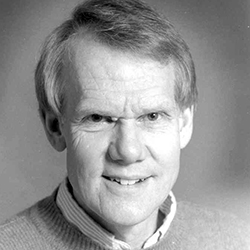James S. House Ph.D.
 Angus Campbell Distinguised University Professor of Survey Research, Public Policy and Sociology
Angus Campbell Distinguised University Professor of Survey Research, Public Policy and Sociology
Institute for Social Research
University of Michigan
Email: jimhouse@umich.edu
Discipline: Social Psychology
Expertise: Health Care Inequalities, Public and Population Health
Investigator Award 
Social Inequalities in Aging and HealthAward Year: 1996 While it is increasingly recognized that medical care is not a major determinant in improving population health, the effects of medical, socioeconomic, and psychosocial factors remain subject to dispute. Dr. House articulates and tests a conceptual framework arguing that psychosocial and socioeconomic conditions of life are major determinants of population health. His work clarifies the combined effects on health of such factors as smoking, drinking, exercise, weight, financial insecurity, social relationships and support, personality dispositions, religious participation and beliefs, and social roles. Using a longitudinal national probability sample of 3,617 adults, he provides an empirical assessment of his conceptual framework. The results illuminate: 1) the prospective impact of psychosocial and socioeconomic variables on mortality and changes in health; 2) the degree to which persons with favorable risk factors can age successfully or postpone major morbidity and functional limitations until late in life; and 3) how differential exposure to risk factors can account for socioeconomic and related social inequalities in health, as well as the way health changes with age.
Background 
James S. House is Angus Campbell Distinguished University Professor of Survey Research, Public Policy and Sociology at the Institute for Social Research and research professor in the department of epidemiology at the University of Michigan. Previously, he was the director of the Survey Research Center in the Institute for Social Research, professor and former chair of the department of sociology, and senior research scientist. He received his Ph.D. in Social Psychology from the University of Michigan in 1972 and served as instructor, assistant professor, and associate professor in the department of sociology of Duke University from 1970 to 1978. Throughout his career his research has focused on the role of social and psychological factors in the etiology and course of health and illness, initially on occupational stress and health, later on social relationships and support in relation to health, and currently on the role of psychosocial factors in understanding and explaining social inequalities in health and the way health changes with age. He is an elected member of the American Academy of Arts and Sciences and the Institute of Medicine of the National Academies of Science.
- Arno, P.S., House, J.S., Viola, D., Schechter, C. Social Security and Mortality: The Role of Income Support Policies and Population Health in the U.S. Journal of Public Health Policy, 2011; 32(2): 234-50.
- House, J.S. Toward a Better Estimation of the Effect of Job Loss on Health. J of Health and Social Behavior, 2007, 48(4): 369-84.
- House, J.S., Lantz, P.M., Herd, P. Continuity and Change in the Social Stratification of Aging and Health over the Life Course: Evidence from a Nationally Representative Longitudinal Stude from 1986 to 2001/2. J of Gerontology Series B: Psychological Sc
- Lantz, P.M., House, J.S., Mero, R.P., Williams, D.R. Stress, Life Events, and Socioeconomic Disparities in Health: Results from the Americans' Changing Lives Study, J of Health and Social Behavior, 2005, 46, 3, 274-88
- Musick, M.A., House, J.S., Williams, D.R. Attendance at Religious Services and Mortality in a National Sample. J of Health and Social Behavior, 2004, 45(2): 198-213.
- House, J.S. Understanding Social Factors and Inequalities in Health: 20th Century Progress and 21st Century Prospects. J of Health and Social Behavior, 2002, 43(2): 125-42.
- Lantz, P., Lynch, J., House, J., Lepkowski, J., Mero, R., Musick, M., Williams, D. Socioeconomic Disparities in Health Change in a Longitudinal Study of U.S. Adults: The Role of Health-Risk Behaviors. Social Science and Medicine, 2001, 53(1): 29-40.
- House, J.S., Lepkowski, J.M., Williams, D.R., et al. Excess Mortality among Urban Residents: How Much, for Whom, and Why? AJPH, 2000, 90(12): 1898-904.
- Lynch, J.W., Davey Smith, G., Kaplan, G., House, J.S. Income Inequality and Mortality: Importance to Health of Individual Income, Psychosocial Environment, or Material Conditions. BMJ, 2000, 320(7243): 1200-4.
- Lantz, P., House, J., Lepkowski, J., Williams, D., Mero, R., Chen, J. Socioeconomic Factors, Health Behaviors, and Mortality - Results from a Study of US Adults. JAMA, 1998, 279(21): 1703-8.
